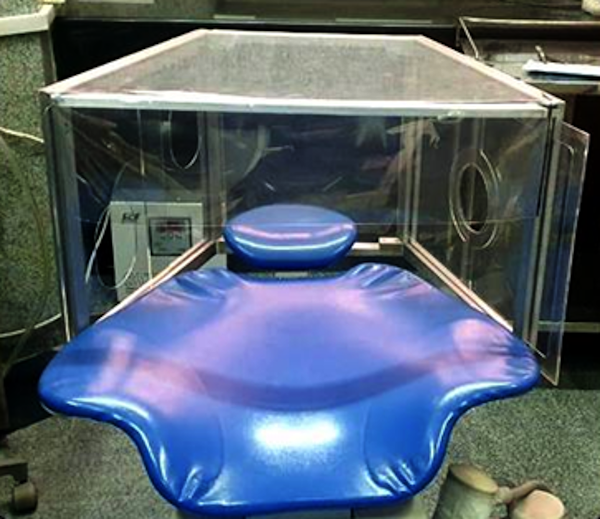In the wake of evolving pandemic situation of COVID-19 outbreak in India, the Central Scientific Instruments Organisation (CSIR-CSIO), Chandigarh, has developed “Aerosol Restricting Canopy (ARC) for Dental Procedures – Safety ARC” in collaboration with the Oral Health Sciences Center (ORHC), PGIMER, Chandigarh, to assist dental procedures.
The technology is transferred to M/s Nigam Scientific Works, Chandigarh, and the agreement for the same was signed by Mahesh Nigam (Director, Nigam Scientific Works) and Dr. Surender Singh Saini (Head, Business Initiatives & Project Planning, CSIR-CSIO, Chandigarh) in the presence of Dr. Sanjay Kumar, Director, CSIR-CSIO.
While describing its features, the Principal Investigator, Dr. Sanjeev Verma, told that although personal protective equipment (PPEs) are used for giving emergency care, dental settings have unique characteristics that warrant additional infection control considerations. Additional precautions are needed because dental and oral surgery procedures use drills or ultrasonic devices that cause aerosol release, which can be the leading cause of infection spread in dental clinic.
“ Presently, assistive aids like face masks and face shields are being used during dental procedures. These aids help in restricting the transfer of infectious aerosol from the patients to the doctor, but do not stop the spread of aerosols to the atmosphere around the patient ”
Dental aerosols get spread in 30 feet range and are some of the most dangerous contamination carriers in the dental working environment. Not only is someone at risk of inhaling infectious particles, but also that these particles remain suspended in the air, settle on surfaces and are often re-aspirated. Dental procedures can increase the bacteria levels to almost 20 times. The prototype was tested successfully in association with ORHC and has been found clinically useful to combat all infectious diseases including COVID-19.
“Presently, assistive aids like face masks and face shields are being used during dental procedures. These aids help in restricting the transfer of infectious aerosol from the patients to the doctor, but do not stop the spread of aerosols to the atmosphere around the patient”, said Dr. Sanjay, Director, CSIR-CSIO.
“To effectively shield a doctor and dental assistant from the patient’s airway during dental procedures, an Aerosol Restricting Canopy is required, which should cover the required area over the patient while allowing the doctor to move arms freely to perform all the necessary tasks during dental procedures,” told Dr. Vinod Karar.
“The Safety-ARC can be fixed on a movable platform, which has height adjustments, and can be oriented in the desired direction. The system has sliding windows covered with disposable sheets, which reduces the transfer of infection from patient to patient and reduces the dependencies on sterilization. It has optional feature of aerosol suction from the canopy using the dental chair suction pump”, told by Dr. Dinesh Pankaj.
The industry partner has already manufactured its prototype and intends to do its mass production to commercialize it very soon. The technology transfer event was held through video conferencing and digital media between both the parties.
Source: Vigyan Prasar
Image Courtesy: VigyanPrasar
You may also like
-
New Heat-Based Approach To Cancer Treatment Can Reduce Chemotherapy Doses
-
Scientists Take A Major Step Towards Unification Of Classical & Quantum Gravity
-
India Graphene Engineering and Innovation Centre (IGEIC) Under the Vision of Viksit Bharat@2047 Launched
-
New High-Performance Gas Sensor can Monitor Low Level Nitrogen Oxides Pollution
-
Antidepressant Drug can be Repurposed for Treating Breast Cancer
